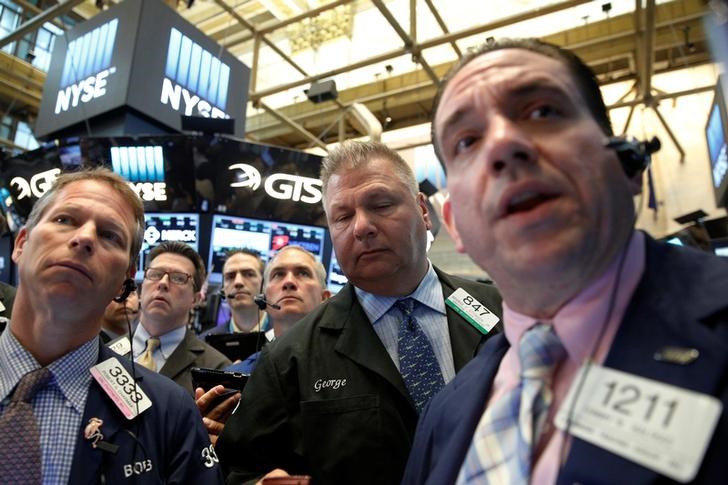By Richard Leong
NEW YORK (Reuters) - U.S. stock prices rose on Friday, marking four straight weeks of gains, while sterling dropped on bleak data that raised fears about a possible British recession following the country's June 23 vote to leave the European Union.
Concerns about global oversupply hurt oil prices, increasing their weekly losses.
Bond and gold prices fell on expectations the Federal Reserve may raise interest rates by year-end following a recent batch of encouraging U.S. economic data.
"Earnings have been positive for the most part. You have a strong package of data that have been constructive on the equity market, pushing up bond yields and even taking some shine off gold's recent strong performance," said Quincy Krosby, market strategist at Newark, New Jersey-based Prudential Financial (LON:PRU).
The U.S. S&P 500 and Dow equity indexes reversed earlier losses, edging towards record highs hit earlier this week, on renewed strength in the tech and telecom sectors and a stronger-than-expected report on manufacturing. The indexes had fallen earlier on disappointing news from companies including General Electric (N:GE) and Honeywell (N:HON).
The Dow Jones industrial average (DJI) closed up 53.62 points, or 0.29 percent, at 18,570.85, the S&P 500 (SPX) ended 9.86 points, or 0.46 percent, higher at 2,175.03 and the Nasdaq Composite (IXIC) finished up 26.26 points, or 0.52 percent, at 5,100.16.
For the week, the Dow was up 0.3 percent, S&P up 0.6 percent and Nasdaq up 1.4 percent.
Europe's broad FTSEurofirst 300 index (FTEU3) ended little changed at 1,344.11, paring earlier losses linked to lower mining shares and Swedish construction from Skanska (ST:SKAb).
Japan's Nikkei (N225) closed down 1.1 percent.
The MSCI world equity index (MIWD00000PUS), which tracks shares in 45 nations, rose 0.3 points or 0.07 percent, to 412.73.
Among major currencies, sterling booked the biggest daily move, losing nearly 1 percent to $1.3105
These purchasing manager figures were consistent with a broader 0.4 percent British economic contraction in the third quarter, pushing up the probability of a recession.
The euro weakened further on news that gunmen attacked a shopping mall in Munich, Germany. It was last down 0.5 percent at $1.0967.
The dollar index (DXY) was up 0.4 percent at 97.410.
The fallout from the Brexit decision is expected to dominate discussions at a weekend meeting of G20 finance ministers and central bank governors in Chengdu, China.
Recent solid readings on the U.S. economy have revived bets the Fed may raise interest rates by year-end. That put pressure on gold prices and core government bond yields.
Benchmark 10-year U.S. Treasury yields rose almost 1 basis point at 1.571 percent, while 10-year German bond yields were flat at -0.1 percent
Spot gold prices
The U.S. central bank will hold a policy meeting next week where policymakers are widely expected to keep rates steady.

In the oil market, Brent crude (LCOc1) settled down 51 cents or 1.1 percent at $45.49 a barrel. U.S. crude (CLc1) settled down 56 cents or 1.25 percent at $44.19 a barrel.